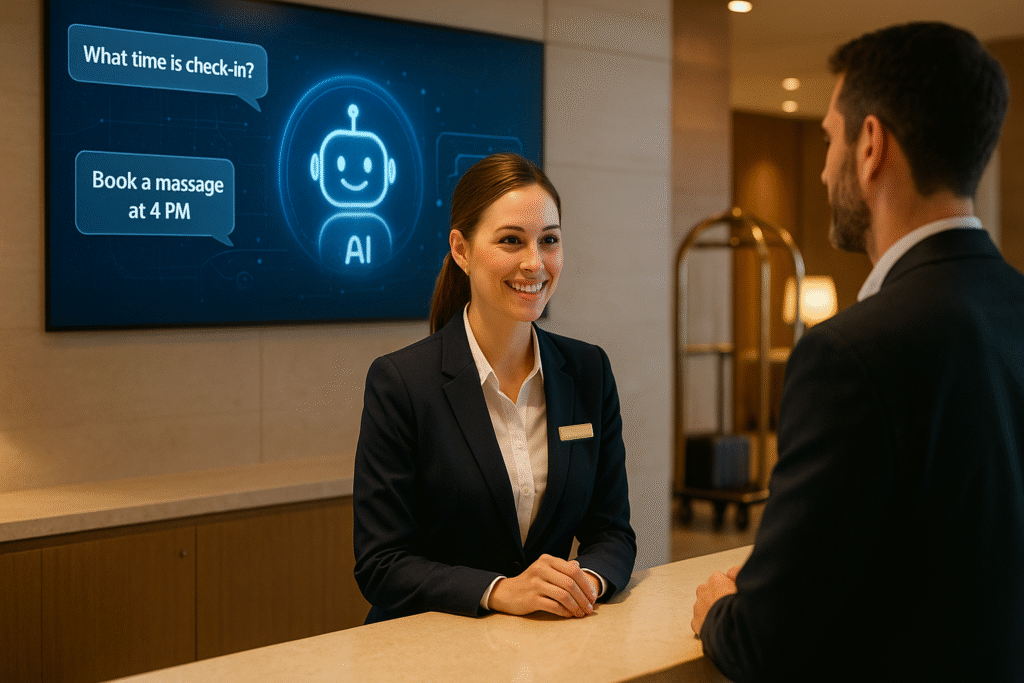“Easily Automate Hotel Booking and amenity questions with AI, freeing up your front desk staff to focus on providing genuine hospitality and creating memorable guest experiences.”
“Front desk, how can I help you?”
If you work in a hotel, you probably say or hear that phrase a hundred times daily. The phone is a constant companion, ringing off the hook. At the same time, a line of guests forms at the counter, some waiting to check in, others asking simple questions. Another guest flags you down to ask about the pool hours for the third time this hour. Your team is stretched thin, trying to be everywhere at once, answering the same questions repeatedly. It’s a high-stress, high-pressure environment. While your staff does a fantastic job, this constant juggling act is your operation’s biggest bottleneck.
What if there was a better way? What if you could clone your best front desk agent—one who knows everything, never gets tired, speaks multiple languages, and can talk to dozens of guests at once? What if you could free up your human team to focus on what they do best: providing genuine, personal hospitality that makes guests feel truly valued?
This isn’t science fiction. This is the reality of hotel front desk automation. This article will show how you can revolutionize your hotel’s operations by automating booking inquiries, check-in questions, and amenity requests. We will explore how AI-powered voice agents can streamline your front desk, reduce costs, and deliver the instant, accurate responses your modern guests expect. Let’s dive in and see how you can free up your front desk for good.

The Front Desk Bottleneck: Why Your Best People Are Buried in Busywork
Before discussing solutions, we need to understand the real-world challenges your front desk team faces daily. Their job is the hotel’s central nervous system, but it’s often overloaded with repetitive, low-impact tasks that create a significant operational drag.
A Day in the Life of the Front Desk
Imagine it’s 3:00 PM on a Tuesday—check-in time. The lobby is buzzing. A family with tired kids is waiting to get their keys. Behind them, a business traveler is tapping his foot, anxious to get to his room and prepare for a meeting. The phone rings. It’s a potential guest asking about your pet policy and room availability for next month. While you’re quoting rates, another guest walks up to the desk to ask for the Wi-Fi password—an email dings—a question about airport shuttle services.
This is the daily reality. Your staff is constantly context-switching, moving from a complex booking issue to a simple directional question in seconds. Research and our experience show that an astonishing 80% of the questions the front desk receives are the same dozen or so queries.
The “Greatest Hits” of Repetitive Questions:
- What time is check-in/check-out?
- What’s the Wi-Fi password?
- What are the pool/gym/restaurant hours?
- Do you have parking? Is it free?
- Can I have a late check-out?
- How do I get to [local attraction]?
- Do you allow pets?
- Can you send more towels/pillows to my room?
- Is breakfast included? What time is it served?
Answering these questions is, of course, part of the job. However, when these simple queries make up most of your team’s interactions, there is little time for anything else. Staff are constantly interrupted, preventing them from focusing on more complex and valuable tasks.
The Real Cost of an Overwhelmed Staff
This relentless cycle of repetitive work has serious consequences that ripple through your entire hotel, affecting your staff, guests, and ultimately, your bottom line.
First, let’s consider the impact on your team. Front desk jobs are notorious for high burnout rates and employee turnover. Why? Because being a human FAQ machine is mentally exhausting. Talented hospitality professionals want to create exceptional guest experiences, not just reciting pool hours. Job satisfaction plummets when their skills are underutilized and they feel stuck in a loop. This leads to higher turnover, which means you’re constantly spending time and money recruiting, hiring, and training new people, only to see the cycle repeat itself.
Second, the bottleneck directly harms the guest experience. Today’s travelers are accustomed to instant gratification. They can order food, book a flight, and stream a movie in seconds from their phones. They don’t want to wait on hold for five minutes just to ask about parking. They don’t want to stand in a line behind three other people to find out the gym’s closing time. These minor friction points add up, creating a poor first impression and a lasting sense of inefficiency. Furthermore, a stressed or new employee might accidentally provide inconsistent or incorrect information, leading to guest frustration and negative reviews.
Finally, there’s the challenge of 24/7 service. Guest needs don’t stop at 11:00 PM. A guest arriving on a red-eye flight at 3:00 AM might have questions. Someone from a different time zone might be looking to automate a hotel booking on your website in the middle of the night. Staffing the front desk around the clock is incredibly expensive, and it’s not feasible for many smaller hotels. This leaves a service gap during off-peak hours, precisely when a guest might feel most helpless. The front desk bottleneck isn’t just an inconvenience; it’s a fundamental operational problem that costs you money, talent, and guest loyalty.
Enter Automation: Your New Digital Team Member
So, how do you solve this puzzle? How do you provide instant, 24/7 service without burning out your staff or your budget? The answer is innovative hotel technology, specifically the strategic use of AI solutions for hotels to automate guest inquiries and streamline front desk operations.
When people hear “AI” or “automation,” they sometimes picture impersonal, clunky robots from a 1980s movie. Let’s clear that up right away. Modern hotel customer service automation is not about replacing your human staff. Instead, it’s about augmenting them. Think of it as hiring a super-efficient digital assistant who handles all the boring, repetitive stuff, freeing up your human team to do the work that requires empathy, critical thinking, and a personal touch.
The Power of an AI Voice Assistant for Hotels
The real star of this show is the AI voice assistant, also known as a virtual concierge. This sophisticated software is designed to understand and respond to human language, whether spoken or typed. It’s the technology that powers Alexa and Google Assistant, but it’s tailored specifically for the hospitality industry.
Here’s a simple breakdown of how it works:
- When a Guest Asks a Question: They can type it into a chat window on your website, speak to a device in their room, or even send a message via WhatsApp. For example, “What time does your restaurant open for dinner?”
- The AI understands: Using Natural Language Processing (NLP) technology, the AI comprehends the intent behind the question. It knows “restaurant open,” “dinner time,” and “when can I eat” all mean the same thing.
- The AI Finds the Answer: It instantly pulls the correct information from its knowledge base—a digital brain you’ve filled with all your hotel’s specific details.
- The AI Responds: It provides a clear, concise, and conversational answer in seconds. “Our restaurant, The Oak Grill, is open for dinner from 6:00 PM to 10:00 PM. Would you like me to make a reservation for you?”
Notice that last part? A well-designed AI doesn’t just answer; it anticipates the next need. This is where AI in the hospitality industry becomes truly powerful. It can seamlessly guide a guest from a simple question to a revenue-generating action.
What Can You Actually Automate?
The applications are vast but generally fall into three key categories that directly address the front desk bottleneck.
1. Automate Hotel Booking Inquiries
The booking process is often a guest’s first interaction with your hotel. A clunky or slow experience can send them to a competitor or an OTA that takes a hefty commission. An AI assistant on your website can be a 24/7 reservations agent.
- Availability & Rates: It can instantly answer questions like, “Do you have a king room available for October 10th to the 12th?” and provide real-time pricing.
- Room Details: It can describe the differences between a Deluxe Room and a Junior Suite, complete with photos and lists of amenities.
- Policy Questions: It can clarify your cancellation policy, pet fees, or check-in requirements, preventing future misunderstandings.
- Booking Guidance: For users ready to book, it can guide them directly to the booking engine, ensuring a smooth path to conversion and increasing your direct, commission-free revenue.
This level of hotel booking automation captures leads you would otherwise miss—the late-night planners, the international travelers, and the simply impatient who won’t wait for an email response.
2. Automate Guest Inquiries (Before, During, and After their Stay)
This is where you can eliminate the bulk of those repetitive phone calls. A virtual concierge can become the single source of truth for all general hotel information.
- Pre-Stay: Guests planning their trip can ask about parking, airport transportation, local attractions, and more. This builds confidence and helps them prepare for their visit.
- In-Stay: This is the big one. Guests can access the AI on their phones by placing a simple QR code in the room. There is no need to call the front desk. They can instantly get the Wi-Fi password, order more towels, find the pool hours, or troubleshoot the TV remote. This empowers guests and gives them control over their experience.
- Post-Stay: The service doesn’t have to end at check-out. The AI can assist with requests for copies of receipts or help a guest who thinks they left an item behind, keeping the lines of communication open and professional.
3. Create a Seamless Hotel Amenity Booking System
How much time does your staff spend on the phone coordinating spa appointments, dinner reservations, or tee times? An AI assistant can handle all of this.
- Guest: “I’d like to book a massage for tomorrow.”
- AI: “Certainly. We have openings for our Swedish Massage at 2:00 PM and 4:00 PM. Which would you prefer?”
- Guest: “4:00 PM sounds great.”
- AI: “Excellent. I’ve booked a 60-minute Swedish Massage for you for tomorrow at 4:00 PM. A confirmation has been sent to your email. Is there anything else?”
This entire interaction happens automatically. The AI checks real-time availability in your scheduling system, makes the booking, and sends a confirmation. It’s efficient for the guest and requires zero time from your spa or front desk staff. This transforms a multi-step manual process into a simple, automated conversation.
The Tangible Benefits: More Than Just a Cool Gadget
Implementing this kind of innovative hotel technology isn’t about chasing trends. It’s a strategic business decision with clear, measurable benefits that impact every aspect of your operation. Let’s break down the “why” and explore the powerful return on investment.
Drastically Reduced Workload and Happier Staff
This is the most immediate and profound benefit. By automating up to 80% of routine inquiries, you can relieve a massive burden on your front desk team.
- The Phone Finally Stops Ringing: Imagine the peace and focus resulting from a 50%, 60%, or 70% reduction in inbound calls. Your team can finally give their full attention to the guest standing before them without constant interruptions.
- From Reactive to Proactive: Freed from being human rolodexes, your staff can transform their roles. Instead of just answering questions, they can proactively enhance the guest experience. They have the mental bandwidth to notice a guest is celebrating an anniversary and arrange for a complimentary bottle of champagne. They can offer personalized dinner recommendations based on a real conversation. They become true hospitality ambassadors, not just information clerks.
- Increased Job Satisfaction: This shift makes the front desk job far more rewarding. When employees feel their skills are being used effectively and making a real difference, their morale and job satisfaction soar. This, in turn, significantly reduces costly employee turnover and creates a more stable, experienced team.
An Unforgettable Guest Experience
In the competitive hospitality market, the guest experience is everything. Automation helps you deliver a modern, seamless, and highly satisfying stay.
- The Power of “Now”: Modern guests crave immediacy. With an AI assistant, they get answers instantly, 24/7. No more waiting on hold. No more searching through a clunky website. They get the information they need, the moment they need it. This instant gratification is a powerful driver of guest satisfaction.
- Consistency and Accuracy, Guaranteed: A human might be tired, new, or having a bad day. An AI is never any of those things. It delivers the same, correct information every single time. The pool hours will always be right, and the Wi-Fi password will never be misquoted. This reliability builds trust and eliminates a common source of guest frustration.
- Effortless Service: Think about ordering extra towels. The traditional way involves finding the phone, dialing the front desk, waiting for someone to answer, making the request, and then waiting for it to be relayed to housekeeping. The guest scans a QR code with automation and types “extra towels.” The request goes directly to the housekeeping department’s system. It’s faster, more efficient, and feels effortlessly modern to the guest.
A Stronger Bottom Line: Increased Revenue and Smart Savings
Every decision in your hotel needs to make financial sense; this is where hotel front desk automation truly shines. The ROI is clear and multifaceted.
- Significant Labor Cost Savings: By handling the bulk of inquiries, an AI assistant reduces the need for additional staff, especially during overnight shifts or seasonal peaks. You can run a leaner, more efficient operation without sacrificing service quality. In fact, you’re improving it while lowering overhead.
- The AI Upsell Engine: An AI virtual concierge can be your best salesperson. It can be programmed to make intelligent, timely suggestions.
- The AI can mention the hotel’s personal training sessions when a guest asks about the gym.
- When they book a table at the restaurant, it can promote the evening’s wine special.
- When they ask for a late check-out, they can offer it for a nominal fee, creating a new revenue stream. These suggestions feel helpful, not pushy, and can significantly increase ancillary revenue.
- Driving Commission-Free Direct Bookings: The AI assistant on your website is a powerful tool to fight back against the high commissions charged by Online Travel Agencies (OTAs). By engaging visitors in real-time, answering their questions, and showcasing your property’s unique value, the AI can capture bookings that might have otherwise gone to an OTA. Every direct booking puts more money straight into your pocket.
Combining operational efficiency, enhanced guest satisfaction, and new revenue opportunities, AI in the hospitality industry becomes a powerful engine for profitability and growth.
Your Practical Roadmap to Implementation
Implementing new technology can feel daunting, but modern platforms have made it surprisingly straightforward. You don’t need a team of developers or a massive IT budget. Here is a simple, four-step guide to get you started.
Step 1: Pinpoint Your Biggest Headaches
Before you do anything, you must know what you’re trying to fix. Get your team together and start gathering data.
- Create a “Top 20” List: Have your front desk staff tally every question they receive on the phone and in person for one week. At the end of the week, you’ll have a crystal-clear list of your most frequently asked questions. This list is the foundation for your AI’s knowledge base.
- Identify Bottlenecks: Where do things get stuck? Is it the morning check-out rush? Is it the flood of calls between 4 and 6 PM from people trying to make dinner reservations? Understanding your peak pain points will help you prioritize what to automate for the most significant impact.
Step 2: Choose the Right Platform
Not all AI platforms are created equal. The key is finding a powerful yet simple solution, allowing you to stay in control without needing a degree in computer science. Look for these key features:
- A No-Code Interface: This is critical. A “no-code” platform means you can build and manage your AI assistant through a simple, intuitive interface, often just by typing or using drag-and-drop tools. You should not have to write a single line of code.
- Easy Customization: Your AI should reflect your hotel’s unique brand and voice. You need a platform to easily input your specific information, from room types and amenity hours to your concierge’s favorite local restaurants.
- Scalability: Start small. You can automate the top 10 FAQs. But as you see the benefits, you’ll want to add more capabilities, like a complete hotel amenity booking system. Choose a platform that can grow with you.
Step 3: “Train” Your Digital Assistant
“Training” the AI sounds complex, but it’s just a matter of giving it the information it needs to be helpful. Think of it like creating the ultimate employee handbook.
- Build the Knowledge Base: Take that “Top 20” list of questions you created and write the perfect, concise answer for each.
- Upload Your Documents: Most modern platforms allow you to upload existing documents, such as PDFs of your restaurant menu, guest services directory, or local area guides. The AI can read and learn from this information automatically.
- Define the “Personality”: Do you want your AI to be formal and professional or friendly and casual? You can define its tone of voice to ensure it aligns perfectly with your brand. The more information and context you provide, the more thoughtful and helpful your AI will become.
Step 4: Deploy and Let Your Guests Know
Once your AI is trained, it’s time to introduce it to your guests. You can make it accessible through multiple channels:
- On Your Website: Add a simple chat widget so potential guests can get instant answers and automate hotel booking inquiries.
- In the Room: A simple card or sticker with a QR code is the most effective method. Guests can scan it with their phone’s camera, which will instantly open a chat with your virtual concierge. There is no app to download, no new device to learn.
- In Your Lobby and Common Areas: Place QR codes near the front desk, in the elevator, or by the pool to encourage guests to use the service instead of waiting in line.
Finally, promote it! When guests check in, have your staff say, “For any questions during your stay, from the Wi-Fi password to dinner reservations, simply scan the QR code in your room for instant help from our 24/7 virtual assistant.” This sets the expectation and drives adoption.
Introducing ScaleWise AI: The Smartest, Simplest Solution
You’ve seen the massive potential of hotel automation, but you might be considering the cost and complexity. Many enterprise-level AI solutions are expensive and require a team of experts to manage. This is where ScaleWise AI changes the game.
We created ScaleWise AI to put the power of advanced artificial intelligence into the hands of everyone—especially businesses like yours. It is a free, powerful, and no-code platform where you can build custom AI agents in minutes, not months.
The ScaleWise AI Difference
- Completely Free to Start: We believe this technology should be accessible. You can sign up and build your first AI voice agent today without spending a dime. There are no prohibitive setup fees or long-term contracts.
- Radically Simple, No-Code Builder: If you can write an email or create a document, you have all the skills to build a sophisticated virtual concierge on ScaleWise AI. Our intuitive interface lets you simply type or upload your hotel’s information; our platform does the rest.
- Total Control and Customization: Your AI agent should reflect your brand. With ScaleWise AI, you customize everything—its knowledge, personality, and interaction with your guests. You are in complete control.
- More Than Just a Chatbot: ScaleWise AI is a versatile platform. Yes, you can build a brilliant virtual concierge for hotels. However, you can also create AI agents to train new employees on your standard operating procedures. Or you could have your head concierge create a premium AI agent that acts as an exclusive local tour guide, which you can offer guests as a paid add-on. The possibilities are endless.
- Always On, Always Learning: Your ScaleWise AI agent works 24/7/365. It never calls in sick, never has a bad day, and gets smarter over time as you add more knowledge to it.
Stop letting your best people get bogged down by repetitive work. Free up your front desk so they can create the unforgettable experiences your guests deserve.
Ready to see how easy it is? Visit ScaleWise AI today and build your hotel’s first AI agent for free.
The Future of Hospitality is Here
The daily grind of the hotel front desk doesn’t have to be a chaotic race against the clock. The constant phone calls and repetitive questions that bog your team and frustrate your guests have a clear and accessible solution. You invest strategically in your staff, guests, and bottom line by automating hotel booking and guest inquiries.
AI solutions for hotels are no longer a futuristic concept; they are a practical tool available now. An AI voice assistant is your most reliable employee—one who provides perfect, instant service around the clock, allowing your human team to shine. The results are undeniable: a more efficient operation, a happier and more effective staff, delighted guests who are more likely to return and leave glowing reviews, and a healthier, more profitable business. The time to free up your front desk is now.
Frequently Asked Questions (FAQs)
Q1: Will an AI agent replace my front desk staff?
A: Absolutely not. The goal is to empower your staff, not replace them. The AI handles the high-volume, low-value questions (like Wi-Fi passwords and pool hours), which frees up your human team to focus on high-value interactions that require empathy and complex problem-solving, like handling a service recovery issue or planning a special occasion for a guest.
Q2: Is this technology difficult to set up and maintain?
A: Not with a no-code platform like ScaleWise AI. The setup process is designed to be incredibly simple. You can have your first agent up and running in under an hour by providing basic hotel information. Maintaining it is just as easy—updating the restaurant hours is as simple as editing a line of text in your AI agent’s knowledge base.
Q3: How will my guests actually use the AI?
A: The most common and effective ways are through a chat widget on your website and QR codes placed in guest rooms and common areas. Guests simply use their own smartphones, which they are already comfortable with. There are no apps to download or new hardware to learn, which removes any friction for the guest.
Q4: Can the AI handle multiple languages?
A: Yes. Modern AI platforms like ScaleWise AI can be trained to understand and respond in dozens of languages. This is an incredible benefit for hotels with a diverse, international clientele, ensuring every guest receives prompt and accurate service in their native language.
Q5: What happens if the AI doesn’t know the answer to a question?
A: This is a crucial feature of any sound system. If the AI encounters a question it cannot answer, it should be programmed with a “fallback” action. This could mean seamlessly escalating the chat to a live human agent, providing the front desk’s direct phone number, or taking a message so a staff member can follow up. The guest is never left at a dead end.





